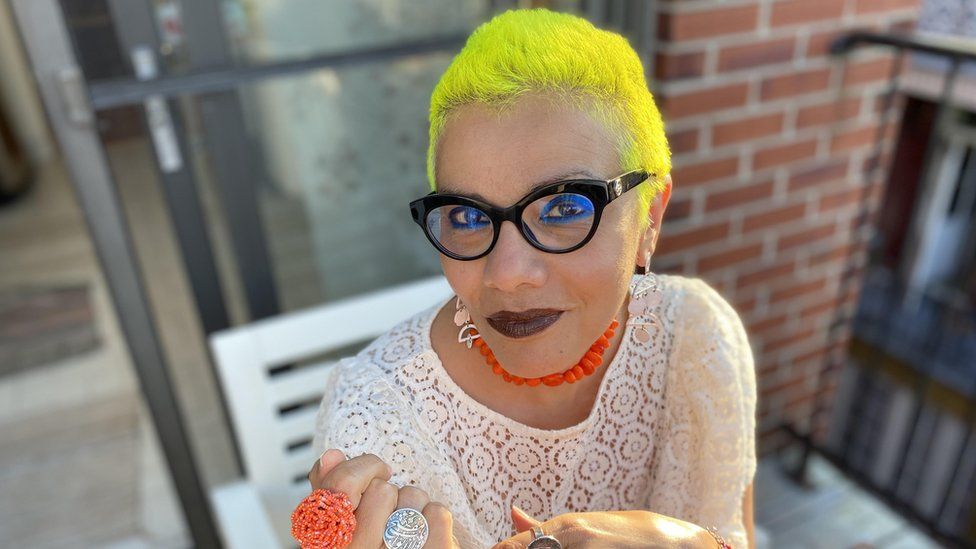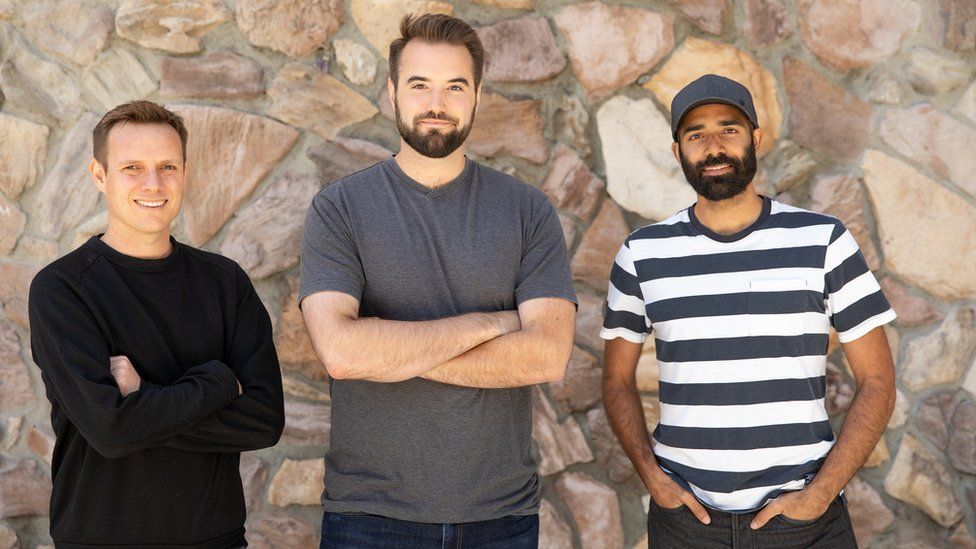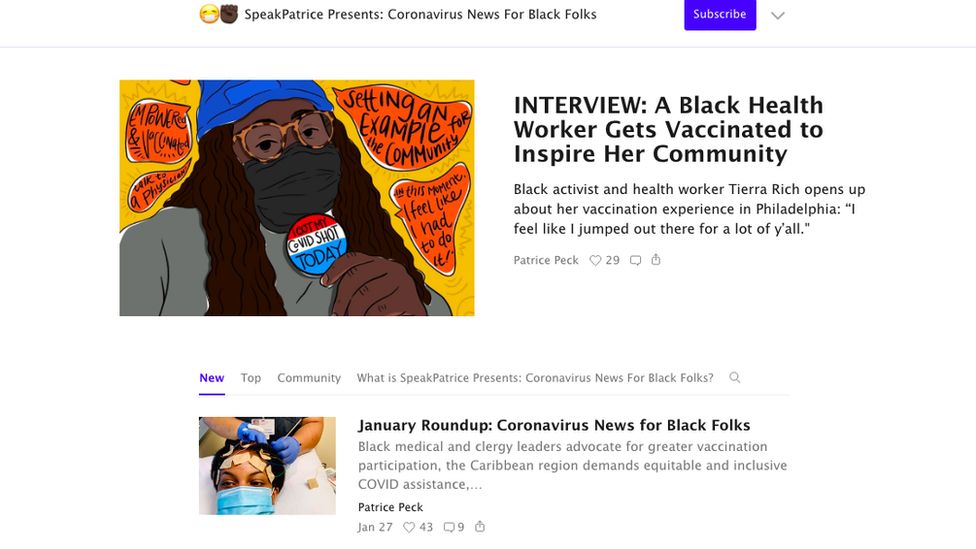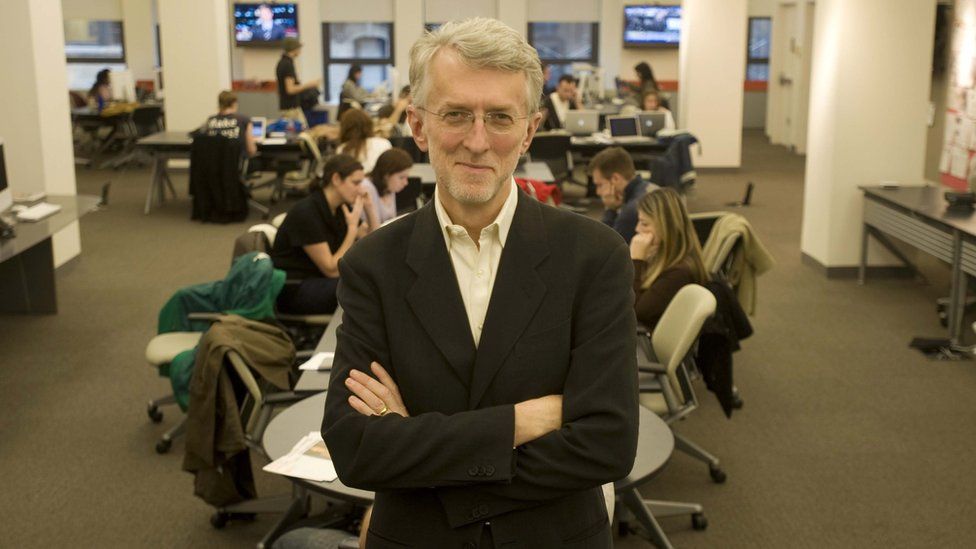
Mona Eltahawy says she wanted to be able to write with strong language to express herself, which includes swear words.
The journalist is no stranger to readers of the New York Times and Washington Post, for which she wrote opinion articles on current affairs about her native Egypt and other countries in the Middle East.
It is a wider region familiar to her after a decade reporting for news agency Reuters out of Cairo and Jerusalem.
But New York-based Ms Eltahawy felt constrained from writing what she truly wanted to publish - feminist essays touching on issues around the world, using bad language that newspaper editors simply wouldn't allow.
"It is politically important to me that I write as I speak - freely, and using swear words as I see fit," she says.
So, in September of last year she joined an online platform called Substack, which allows her to send regular email "newsletters" direct to her followers, and get paid for them.
Ms Eltahawy says that her account - Feminist Giant - now has "hundreds" of paying subscribers. They pay $8 (£5.66) a month, or $80 a year, to receive all her emails and read the same posts on the Substack website.

She adds that thousands of other people have opted for the free subscription version, which means they get to see a reduced number of her articles. "I chose Substack because I had read about it, and liked that other journalists were using it."
San Francisco-based Substack started back in 2017, and while the private company does not reveal exact figures, it is widely reported to have seen user numbers soar over the past year as both writers and readers have flocked to the service.
Co-founder Hamish McKenzie tells the BBC that its thousands of writers have more than 500,000 paid subscribers collectively, which compares with just 11,000 in 2018.
At the forefront of the growing popularity of subscription-based email newsletters, Substack is reported to now be valued at around $650m. This has made some of the largest social media firms sit up and take notice, with Twitter buying Substack rival Revue back in January.
And Facebook is widely reported to be launching its own newsletter service called Bulletin. Meanwhile, other providers include TinyLetter, Ghost, and Lede. Each makes their money by charging the writer a commission.

For journalists and other writers, moving over to these platforms gives them a new stream of income at a time when newspapers are still struggling financially because traditional advertisers have shifted their money to Facebook, LinkedIn and other social media providers.
And for the readers, they can fund their favourite writers directly as opposed to paying for an entire online newspaper subscription that may only feature their preferred columnist weekly.
Mr McKenzie says that Substack, which doesn't carry any advertising, and so doesn't need to chase eyes-on-screen to keep advertisers happy, is changing the "media ecosystem".
"Engagement isn't a metric [for us] because what matters most is trust," he says. "Do you, as a reader, trust this writer enough to invite them into your inbox, and maybe trust them enough to pay them to keep doing what they're doing?"
He adds that the top 10 Substack accounts now earn more than $15m a year collectively. At the top of the tree is one produced by more than one writer - The Dispatch. This is a US centre-right provider of politics and news coverage.


New Economy is a new series exploring how businesses, trade, economies and working life are changing fast.

Reportedly in seventh place on the most-popular list is investigative reporter Glenn Greenwald, formerly of The Guardian and US website The Intercept.
"I saw how Substack started to develop a brand as a recognisable place for writers who felt uncomfortable or disaffected by more mainstream news outlets," he says.
"I would be concerned, though, if it were sold to a social media company... and it had to capitulate to social pressure to make decisions about who can or can't publish on the platform."
Mr McKenzie says that Substack "takes a hands-off, free-market approach to content moderation". This is an area in which it has attracted criticism, including in regard to offering a home to people who have been kicked off social media.
For example, Irish screenwriter Graham Linehan, the co-creator of popular TV comedy Father Ted, was permanently suspended from Twitter in June of last year following, in Twitter's words, "repeated violations of our rules against hateful conduct and platform manipulation" surrounding his views on trans rights. He subsequently moved across to Substack.
Substack's admission of Linehan was questioned both on social media and in newspapers. UK LGBT rights charity Stonewall told the BBC that it "urged Substack to be diligent in investigating concerns and taking swift action against harmful content".
Mr McKenzie says that "our team takes a hardline stance on harassment, threats, spam, pornography, and calls for violence".
Jeff Jarvis, director of the Tow-Knight Center for Entrepreneurial Journalism at the City University of New York, cautions the optimists who lionise Substack and its ilk as the saviours of the media industry.

"Newsletters have been around for centuries so they're nothing new," he says.
He adds that writers need to be well-known before they join one of the newsletter providers. "To be really successful at this, you have to have a tribe that's followed you on social or your own web presence. Or you have to find a market or community that isn't being well-served, and that you can serve uniquely well."
For Patrice Peck, a freelance journalist in Los Angeles, that market was pandemic-related news affecting marginalized communities. So she created a Substack account called Coronavirus News for Black Folks, a newsletter featuring her posts on a reporting blind spot.

"I didn't see many white-staffed newsrooms covering how the black community was being impacted by the pandemic," she says. "And so I started looking at the data on the state level that looked at cases from a race and ethnic perspective, an area very few other journalists were covering."
Making her newsletter free was an important consideration, Ms Peck says. "I was more concerned in ensuring this content got out to as many people as possible."
For those that do charge, and can gain a following, there can be good money to be made, says Mr McKenzie. "If you don't have to pay for infrastructure or a design team, and you can write out of your bedroom, then you only need 1,000 people paying you $100 a year to have a very comfortable living."
"fit" - Google News
June 10, 2021 at 06:12AM
https://ift.tt/3pF5SQL
'I can speak freely and use swear words as I see fit' - BBC News
"fit" - Google News
https://ift.tt/2SpPnsd
https://ift.tt/3aP4lys
Bagikan Berita Ini














0 Response to "'I can speak freely and use swear words as I see fit' - BBC News"
Post a Comment